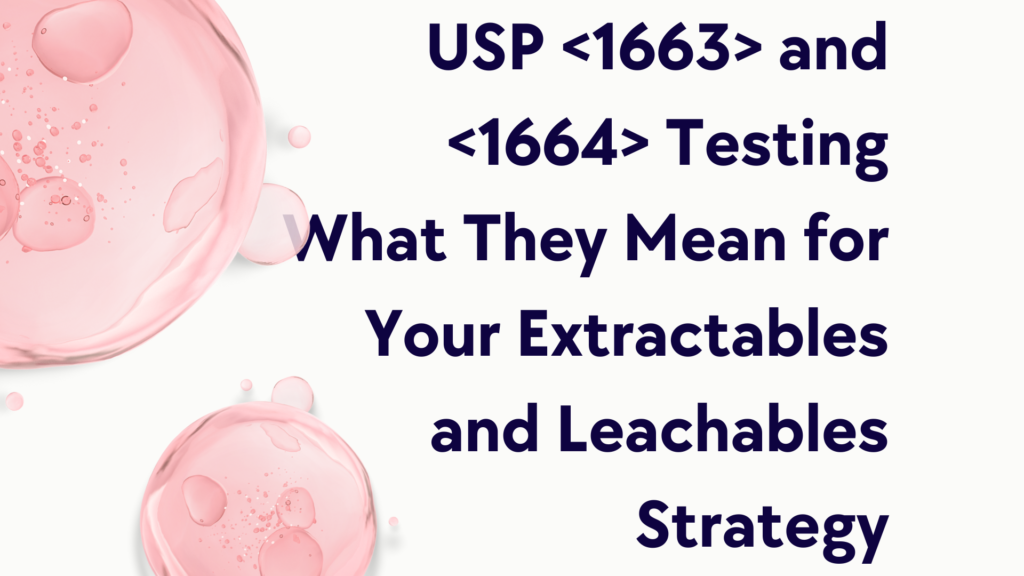
In pharmaceutical and biopharmaceutical development, regulatory expectations for safety have become more stringent. One area where this is especially evident is in Extractables and Leachables Analysis, a vital part of ensuring product safety for drug delivery systems, container closure systems, and medical devices. Among the most important regulatory documents in this domain are USP <1663> and <1664>, which provide guidance for extractables assessment and leachables testing. Understanding and applying these chapters is critical to designing a robust Extractables and Leachables (E&L) strategy.
At ResolveMass Laboratories Inc., we specialize in comprehensive Extractables and Leachables Analysis with advanced instrumentation and regulatory-aligned methodologies. In this blog, we explain what USP <1663> and <1664> mean for your product development and how to align with these guidelines effectively.
Understanding USP <1663> and <1664>
USP <1663>, titled Assessment of Extractables Associated with Pharmaceutical Packaging/Delivery Systems, and USP <1664>, Assessment of Drug Product Leachables Associated with Pharmaceutical Packaging/Delivery Systems, are key guidance chapters issued by the United States Pharmacopeia.
- USP <1663> focuses on identifying and quantifying potential extractable compounds that may migrate from the materials of construction into the drug product.
- USP <1664> covers the actual leachables—compounds that are detected in the drug product under real-time or accelerated storage conditions.
Both documents form the cornerstone of any rigorous Extractables and Leachables Analysis plan.
Why USP <1663> and <1664> Matter in E&L Testing
Aligning with USP <1663> and <1664> ensures compliance with regulatory authorities such as the FDA, EMA, and Health Canada. Non-compliance can lead to significant delays in drug approval or worse—market withdrawals.
These guidelines serve several critical purposes:
- Establish a risk-based framework for conducting E&L studies
- Recommend analytical techniques such as LC-MS, GC-MS, ICP-MS
- Promote standardization and reproducibility in testing
- Enhance patient safety by minimizing exposure to toxic compounds
By implementing E&L strategies consistent with these chapters, you not only meet regulatory expectations but also demonstrate scientific diligence.
Five Key Implications for Your Extractables and Leachables Strategy
1. Material Characterization Must Be Thorough
According to USP <1663>, a comprehensive understanding of the materials used in the product is essential. This involves:
- FTIR and Raman Spectroscopy
- Differential Scanning Calorimetry (DSC)
- Thermal Gravimetric Analysis (TGA)
2. Justification for Solvent and Timepoint Selection
USP <1663> emphasizes using simulation solvents that mimic the formulation of the actual drug product. At ResolveMass Laboratories, we apply a matrix-specific solvent strategy in all Extractables and Leachables Analysis programs.
Visit this step by step guide for pharmaceutical packaging related testing.
3. Leachables Testing Must Mimic Real Conditions
USP <1664> requires leachables studies to reflect actual product storage and administration conditions. We offer full-scope leachables analysis under:
- ICH long-term and accelerated stability conditions
- Light and oxygen sensitivity simulation
4. Analytical Techniques Should Be State-of-the-Art
We utilize high-end analytical platforms to meet the USP guidelines:
- LC-MS for semi-volatile polar compounds
- GC-MS for volatile organics
- ICP-MS for elemental impurities
Right analytical tools will lead you to reliable data. The blog below will walk you through essential techniques like GC-MS, LC-MS, ICP-MS, and more. 👉 Dive deeper into E&L analytical methods
5. Qualification of Detected Compounds
USP <1664> stresses the toxicological qualification of leachables. We collaborate with toxicological consultants and offer in-house safety risk assessment models as part of our Extractables and Leachables Analysis workflow.
This real-world case study showcases our problem-solving approach, advanced analytics, and regulatory insight.
👉 Read the full case study
Why Choose ResolveMass Laboratories for USP <1663> and <1664> Testing?
- Over 10 years of specialized experience in Extractables and Leachables Analysis
- Advanced LC-MS, GC-MS, and ICP-MS platforms
- Customizable testing protocols aligned with USP <1663> and <1664>
- Experienced analytical chemists and regulatory scientists
👉 Read the full guide on choosing an E&L testing CRO
Additional Services That Support USP <1663> and <1664>
- Container Closure Integrity Testing (CCIT)
- Elemental Impurity Profiling (USP <232>/<233>)
- Stability-Indicating Method Development
Explore the full suite here: ResolveMass Services
Conclusion
Understanding and applying USP <1663> and <1664> guidelines is vital for creating a scientifically sound and regulatory-compliant Extractables and Leachables Analysis strategy. At ResolveMass Laboratories Inc., we have the scientific depth, advanced analytical capabilities, and regulatory insight to support your E&L testing from start to finish. Whether you are preparing for an IND, NDA, or ANDA submission, aligning your work with USP <1663> and <1664> is non-negotiable—and we’re here to ensure you succeed.
Contact Us for Custom E&L Testing
ResolveMass Laboratories Inc.: Comprehensive Scientific Expertise You Can Rely On
ResolveMass Laboratories Inc. is a trusted Canadian contract research organization offering a wide spectrum of specialized services spanning polymer synthesis, advanced analytical testing, and custom organic synthesis. With over a decade of experience supporting pharmaceutical, biotech, and industrial clients, we bring scientific precision and regulatory insight to every project. Our core capabilities include Polymer Synthesis and Characterization, Peptide Characterization, Organic Synthesis, Nitrosamine Testing and Analysis, PFAS Testing, and Extractable & Leachable Studies, as well as a broad suite of analytical techniques such as HPLC, GC-MS, MALDI-TOF, NMR, and FTIR.
Our multidisciplinary team includes chemists, analytical scientists, and regulatory experts with advanced academic and industry backgrounds. We excel at developing customized, high-quality solutions—whether you need innovative polymer designs, impurity profiling, or confirmatory testing that meets global regulatory standards.
Clients across North America choose ResolveMass Laboratories for our deep technical knowledge, commitment to quality, and ability to deliver reproducible, reliable data that drives confident decision-making. When precision, innovation, and trust matter—ResolveMass is your partner of choice.
References:

